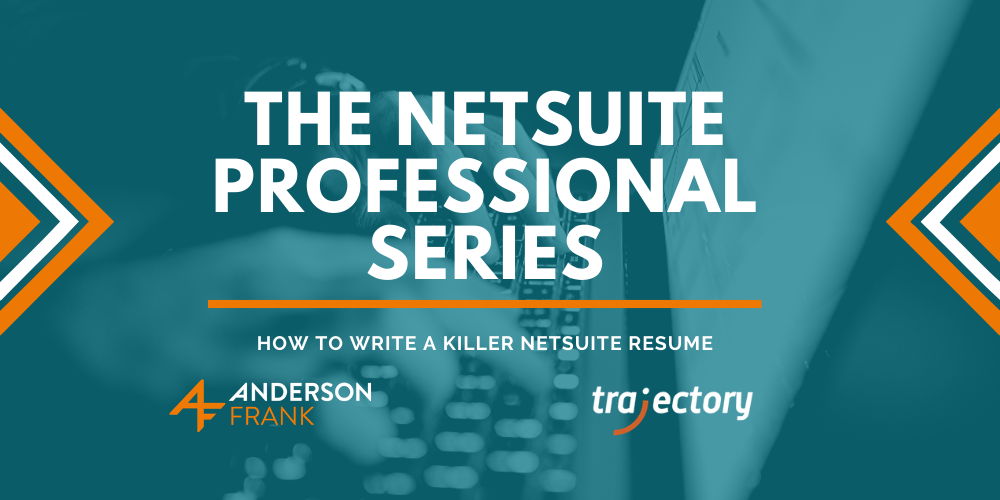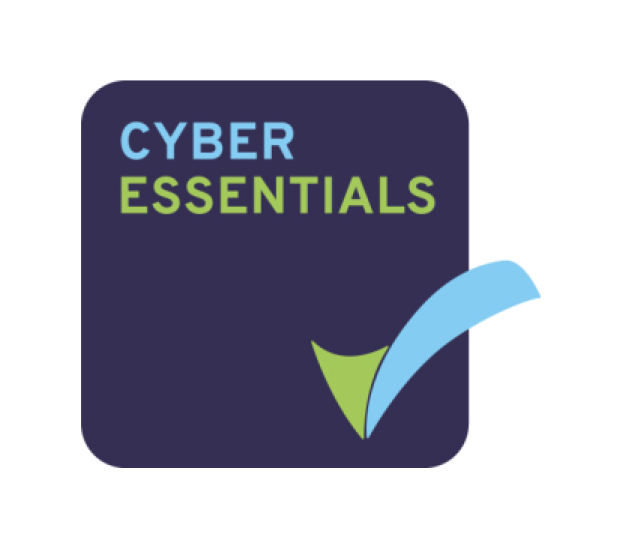
We’ve teamed up with the NetSuite Solution Provider Trajectory Inc to work on a series of articles based on the life of a NetSuite professional. Check out their article: Oracle NetSuite security roles
But first, let’s dive into today’s topic: How to write a killer NetSuite Resume.
- The roles and responsibilities of a NetSuite Admin
- NetSuite tools – the SuiteCloud platform
- NetSuite OneWorld – an Admin guide
- Retraining as a NetSuite Admin: 4 things you need to know
- 6 secrets to climbing the NetSuite career ladder
- Quote to cash | order management system
- 8 must-have NetSuite apps for a happier team
- 9 steps to a NetSuite implementation team
- NetSuite CSV import | ERP data migration process
- How much should you be earning as a NetSuite Admin?
Optimizing your NetSuite resume
It doesn’t matter how qualified you are for a NetSuite role, if your resume doesn’t highlight your skillset and experience correctly, you don’t have a fighting chance of being invited to an interview. So as a NetSuite professional, how can you optimize your resume to help you climb the NetSuite career ladder?
We’ve cross-referenced our knowledge of the industry with insights from our recent Market Trends and Salary Survey to help you write your next NetSuite resume. From overcoming the hiring process algorithms to including the appropriate skillsets for your dream job, here are our essential tips to optimize your NetSuite resume and gain an interview with your next employer.
Showcase your technical skills for the NetSuite industry
It’s natural to obsess over the technical skills section of your resume, as it’s the area the hiring manager will most likely focus on when considering your application. They’re looking for three things in the technical section of your resume: relevant skills to the role, genuine knowledge, and previous experience of those skills.
Some candidates tend to exaggerate their existing technical skillset to make themselves stand out — assuming the more keywords, the more exposure. However, stuffing your resume with keywords is likely to backfire when you’re face-to-face with an interviewer and you can’t answer their questions… Our suggestion? Don’t lie. Instead, highlight your skills and knowledge of the NetSuite industry to demonstrate that you’re right for the role.
Highlight the specific skills you’re strong at and use your spare time to strengthen your knowledge of the areas you’re not so familiar with. The tech industry is all about lifelong learning, and the employer will admire your ambition to self-improve and may even have room in their budget to pay for your training.
Enhance your NetSuite skillset with online training.
We analyzed the insights from our recent independent NetSuite Salary Survey to discover what technical skills and experiences are seen as the most relevant in today’s NetSuite market.
1. Essential factors impacting your earning potential
During our survey, we asked participants to rate what they believed to be essential, important, or useful technical skills that could impact their earning potential.
Essential factors: years of experience, a relevant university degree, and exposure to large projects.
Important factors: exposure to a large project in a specific vertical industry.
Useful factors: having NetSuite certifications.
2. Can you integrate these third-party apps?
The most popular third-party apps to integrate with a company’s NetSuite dashboard are Salesforce, Celigo, Dell Boomi, Megento, AvidXChange, and Jitterbit.
3. Industry experience
The most popular sectors for NetSuite usage: IT Services, software and internet, consultancy, retail, manufacturing, professional services, financial services, wholesale contribution, health, and life sciences.
Size of businesses: 70% of NetSuite professionals in our survey claimed to work in SME-sized companies with fewer than 500 employees, while a further 26% said they worked in a company with less than 200 people.
4. NetSuite products
We asked participants to report which NetSuite products they’ve worked with in the last five years. As part of their core skill set, most respondents had experience working with NetSuite ERP, followed by NetSuite OneWorld and NetSuite CRM.
5. NetSuite implementation
Over three-quarters of our salary participants have been involved in a NetSuite implementation, most respondents claimed the bulk of their involvement was during the migration of different ERP, excel, or legacy system to a NetSuite ERP; followed by changing CRM software, and then migrating from one E-commerce platform to SuiteCommerce.
6. Top NetSuite certifications
Over two-thirds of our respondents reported having at least one NetSuite qualification—a 66% increase from last year’s survey. We found the top three choices for NetSuite certifications were Certified SuiteFoundation, Certified Administrator, and Certified ERP Consultant.
Discover our ultimate guide on NetSuite certifications
7. Education level
In our survey, 66% of the respondents stated they had a bachelor’s degree or an equivalent qualification, with a further 34% claiming they held a Master’s degree or higher. The top degrees for the NetSuite professionals in our survey were computer science, accounting, and business.
Gain further hiring and salary insight by downloading our independent report on the NetSuite industry.

Anderson Frank’s NetSuite Market Trends and Salary Survey takes a comprehensive look at salaries across all NetSuite positions and explores workplace benefits and factors that influence job satisfaction, as well as industry trends, giving you the most up-to-date and comprehensive snapshot of the NetSuite community available anywhere.
Understand the relevance of soft skills on your resume
Most candidates consider examples such as problem-solving, time management, and excellent listening skills in a resume as generic and irrelevant to the job at hand, especially when it comes to tech-heavy roles. Nevertheless, many NetSuite professionals require a range of soft skills to pursue a career in the ecosystem. Almost every tech role relies massively on critical thinkers, the ability to think outside of the box, a keen sense of observation, impeccable patience, and being able to communicate complex ideas to stakeholders from all parts of the business.
The majority of soft skills are transferable from previous jobs, regardless of the industry. All you have to do is cherry-pick the right skills to the job spec, and give an excellent example of why that skill is transferable to the job at hand. Remember, the objective of your resume is not to expand on every element of your soft skills, but to treat them like bait to catch the eyes of potential decision-makers. Once you’ve got their attention, they will use this information as a conversation starter in your interview to find out more about you and how your soft skills will be beneficial to the role.
Here are a few examples on how to transfer your soft skills and why they’re relevant to a NetSuite resume:
Effective communication skills
Overseeing or even leading a NetSuite implementation requires excellent communication skills (both spoken and written). You will need to be able to discuss projects and assignments with your teammates in a constructive manner to make sure the process goes as smoothly as possible without any misunderstandings. Your communication skills can be broken down into verbal communication, written communication, listening skills, accepting and giving feedback, and your ability to reflect on your work.
Problem-solving capability
Don’t be hesitant to discuss challenges in previous projects; in our survey, 43% of our respondents experienced a delay of up to three months during a NetSuite implementation they were involved with. Just because there were challenges to overcome doesn’t mean that your experience is somehow invalid. Employers are looking for candidates who have faced hurdles in previous roles and have come up with solutions, this will give them an insight into how you can solve problems for them in their NetSuite project.
Teaching skills
Teaching skills are often needed at some point during a NetSuite project, whether it’s internal training end-users or supporting junior members of your implementation team. To ensure you’re not passed on for a role, we suggest including examples of when you have applied teaching skills to a previous job. This could be from another NetSuite project or an entirely different role before your NetSuite career.
Team player
Employers are looking for candidates who are team players. Implementing new technologies can often reveal a range of pain points that will need addressing as a group rather than as an individual. In your resume, give examples of how you’ve worked in a team on previous projects. Demonstrate that you can actively listen to others, be accountable for any hiccups during a project, and how you’ve resolved the issue by working cohesively with a diverse range of colleagues to develop goals and define clear steps throughout a project.
Resourcefulness
As we all know, introducing new systems can present obstacles that muddy the waters of a project plan and may not give you a clear path to resolve it. During the hiring process, employers are looking for a level-headed candidate that can be proactive and resourceful to overcome any challenge. Use your resume to show examples of how you’ve tackled an issue in a project, what the outcome was, and how it benefited your organization.
Time management
Time management is essential to making sure your project roadmap stays on track and doesn’t fall behind. Hiring managers are looking for efficient and organized candidates who can prioritize day-to-day tasks to ensure the project runs as seamlessly as possible. Use your resume to highlight how you’ve managed your time effectively in previous roles, what success it brought to your project, and why it will be valuable to the role you’re applying for.

Utilizing the resume scanning process
Contrary to popular belief, your future boss may not be the first person who reads your resume. In some cases, your application can go through several readers before it is even placed in front of the decision-maker!
As a tech professional, you’ll likely start the application process online by uploading your resume to a database, where a computer will retrieve and scanned it for specific keywords that employers are looking for (you can see these keywords in the job ad/person specification!). Next is the screening phase. This is sometimes conducted by the company’s HR or talent acquisition team, but in smaller companies is often handled by the hiring manager of the team you’re applying for.
Due to the volume of responses, screeners tend only to scan your resume and will not have the freedom to make assumptions regarding your skills. Very similar to a computer, they will only approve candidates who meet the specific criteria set by the hiring manager. You’ll need to ensure the right accomplishments and appropriate skillset stand out on the page, so the reader can quickly connect all the dots from the requirements on the job spec to your resume.
Top tip: Try adding a “key skills” section right at the top of your resume so the reader can quickly pick out relevant skills that are tailored to the job spec in question.
Tailor your resume for each NetSuite role
No two roles are the same, and using a cookie-cutter approach is a sure-fire way to send your application to the bottom of the hiring manager’s pile. To improve your chances of getting a reply, we suggest starting with the job spec and working backward to create your application. Highlight all the essential skills and experience required, as well as proven examples from previous projects on how you’ve met the criteria in the past.
Avoiding style over substance
The look of your resume can be a crucial tool in helping your application get recognized. However, don’t become too hung up working on the visual aspects of your resume, rather than focusing on the more significant areas that can help you gain an interview.
The effort given to elements like font type, color scheme, and order of contact details shouldn’t take priority over more important factors such as highlighting the appropriate skillsets and ensuring specific requirements from the job spec are covered —as well as easy to detect! You want your resume to stand out, but you don’t want the visual impact to outweigh the content — you definitely want substance over style.
A rundown on writing a superstar NetSuite resume
Your resume is an employer’s first introduction to you as a NetSuite professional, and as we said at the beginning of the article, to get an interview, you’ll want to ensure your resume highlights aspects of your skillset and experience that will benefit the role in hand. Here is a quick summary of everything we discussed in this article:
- Technical skillset: The decision-maker will be looking for three things in the technical section of your resume, relevant skills to the role, genuine knowledge and previous experience of those skills. Utilize your existing skillset and your understanding of the NetSuite industry to demonstrate how you’re right for the role and use your spare time to strengthen your experience in the areas you’re not familiar with.
- Soft skillsets: As a tech professional, you need a range of soft skills to pursue a career within the ecosystem. The majority of soft skills are transferable from any previous job, regardless of the industry. All you have to do is cherry-pick the relevant skills to the job spec, and give an excellent example of why those skills will be transferable to the job at hand.
- The scanning process: The high volume of applicants will limit a screener’s time to look at your resume. You’ll need to ensure the right accomplishments and appropriate skillset stand out on the page by optimizing the keywords from the job spec.
- Tailor your resume: No two roles are the same, and using a cookie-cutter approach will limit your chances from being seen. To improve your chances of getting a reply, we suggest starting with the job spec and working backward to create a variety of resumes for the different roles you’re applying to.
- Avoid style of substance: Avoid prioritizing elements like font type, color scheme, and order of contact details, instead focus your time on the more valuable components, such as highlighting the appropriate skillsets and ensuring specific requirements from the job spec are covered and easy to detect from a first glance.




